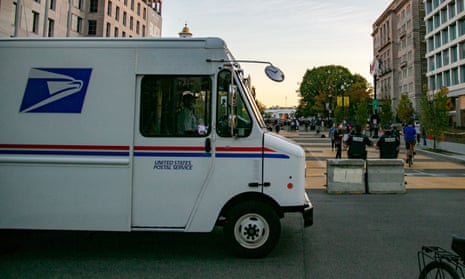A postal worker whose allegations of ballot tampering are the basis of Republican calls for investigations has reportedly recanted his story.
Democrats on the House oversight committee said that Richard Hopkins – the worker who claimed in a signed affidavit that a supervisor at the US Postal Service (USPS) in Erie, Pennsylvania, instructed staff to tamper with ballots by backdating ones that arrived late – had recanted the allegations in an interview with investigators for the USPS inspector general. The Washington Post reported on Tuesday that it had learned from three officials that Hopkins had admitted to fabricating his claims.
Investigators told the committee that Hopkins “did not explain why he signed a false affidavit”, the committee wrote in a statement.
The South Carolina Republican senator Lindsey Graham, who heads the Senate judiciary committee, had held up Hopkin’s affidavit to call for a federal investigation.
BREAKING NEWS: Erie, Pa. #USPS whistleblower completely RECANTED his allegations of a supervisor tampering with mail-in ballots after being questioned by investigators, according to IG.
— Oversight Committee (@OversightDems) November 10, 2020
THREAD:
Hopkins denied he had recanted his testimony in a video posted to YouTube on Tuesday night. “I did not recant my statements,” he said.
The USPS inspector general’s office has not yet publicly disclosed the findings of their investigation.
The US Postal Service Office of Inspector General does not comment on ongoing matters.
The reports that Hopkins had fabricated his claims came as the Trump campaign continued to pursue longshot lawsuits in Pennsylvania, Nevada, Arizona and Georgia that are not backed by credible evidence.
Among these lawsuits is an effort in Pennsylvania to push the US supreme court to reject mail-in ballots that are postmarked by election day and arrived at election offices up to three days later. The state’s supreme court had approved a deadline extension for ballots that arrived late; several other states accept late-arriving ballots.
The Trump campaign attempted to argue in federal court that Republican observers were blocked from monitoring the vote count, until a lawyer for the campaign had to admit that actually a “non-zero” number of observers had been allowed.
These dubious lawsuits and investigations have continued after media outlets projected that Joe Biden was the clear winner of the election. Trump has yet to concede and has illegitimately declared himself the victor.
Top Republicans, including the Senate majority leader, Mitch McConnell, have defended Trump’s right to challenge the election results. On Monday, McConnell said in a speech on the Senate floor that Trump was “100% within his rights to look into allegations of irregularities and weigh his legal options”.
On Monday, the US attorney general sent a memo to prosecutors approving federal investigations into voter fraud, despite a lack of evidence that such fraud was taking place.
In response, the top justice department official in charge of voter fraud investigations, Richard Pilger, resigned, pointing to a 40-year department policy to refrain from intervening in elections and carry out investigations only after elections are certified.
Republicans have been scrambling to drum up any evidence to back their baseless claims of fraud, opening up a hotline that was inundated with prank calls. On Tuesday, Dan Patrick, the Republican lieutenant governor of Texas, said he was offering $1m to incentivize people to come forth with evidence of irregularities.
The party’s efforts are unlikely to have any effect on the outcome of the presidential election. Biden has secured a big enough lead in swing states that even if some ballots that Republicans want thrown out were discarded, he would still win.
But critics have said that the president’s refusal to admit defeat and Republicans’ efforts to challenge the results are sowing doubt in the US elections system.
A Reuters/Ipsos poll this week of 1,363 adults found that 79% of Americans believe Joe Biden won the election, including about 60% of Republicans. About 72% said that the loser of the election should concede. A separate poll from Politico and Morning Consult, however, found that 70% of Republicans do not believe the presidential election was “free and fair”.
The president and his party’s efforts to undermine the effectiveness of the US elections system began before election day.
In August, Trump admitted he was undermining the postal service so the USPS would have a harder time delivering mail-in ballots. Louis DeJoy, the postmaster general and a major Republican donor, was found to have made cuts to the service amid major service delays reported around the country.
This story was updated on 11 November with Hopkins’ video statement denying that he had recanted his testimony.
